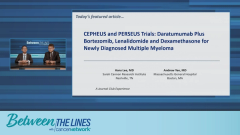
CEPHEUS Trial: MRD Negativity
Panelists discuss updated American Society of Clinical Oncology (ASCO) data showing that adding a CD38 monoclonal antibody to frontline triplet therapy improves minimal residual disease (MRD) negativity and progression-free survival in standard and intermediate-risk multiple myeloma, while reinforcing the need for tailored strategies in high-risk patients.
Episodes in this series

Updated data from a recent study presented at the ASCO meeting reinforces the growing importance of achieving and sustaining MRD negativity in the treatment of multiple myeloma. This study evaluated the addition of a CD38 monoclonal antibody to a standard triplet regimen and showed significantly higher MRD-negative rates at a sensitivity of 10⁻⁵ in patients with standard and revised intermediate-risk cytogenetics. However, among high-risk and revised high-risk subgroups, MRD negativity was comparable between the 4-drug and 3-drug arms, likely due to the small patient sample size.
Importantly, sustained MRD negativity over 12 months was also more frequently observed in the 4-drug regimen, particularly among standard and intermediate-risk patients. These findings correlate with improved progression-free survival in those same groups, supporting the link between deeper, durable responses and long-term clinical benefit. However, outcomes remained poor in patients with multiple high-risk cytogenetic abnormalities, emphasizing a persistent unmet need for this ultra-high-risk subgroup. While the overall data are promising, they also highlight the need for tailored approaches in patients with more aggressive disease biology.
Clinically, the tolerability of the CD38 monoclonal antibody plays a crucial role in decision-making. It is widely seen as the most manageable agent in the 4-drug regimen, often preferred over agents such as proteasome inhibitors, which may carry higher toxicity, especially in frail patients. While the full 4-drug regimen may be ideal for fit individuals, treatment must be individualized based on tolerability and patient-specific factors. These findings contribute to a nuanced understanding of how to optimize frontline therapy and emphasize the evolving role of MRD negativity as a therapeutic goal in newly diagnosed multiple myeloma.
Newsletter
Stay up to date on recent advances in the multidisciplinary approach to cancer.



































